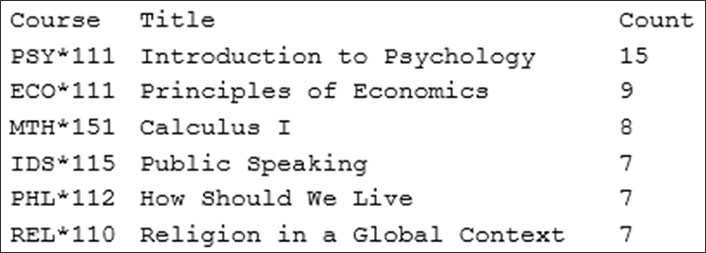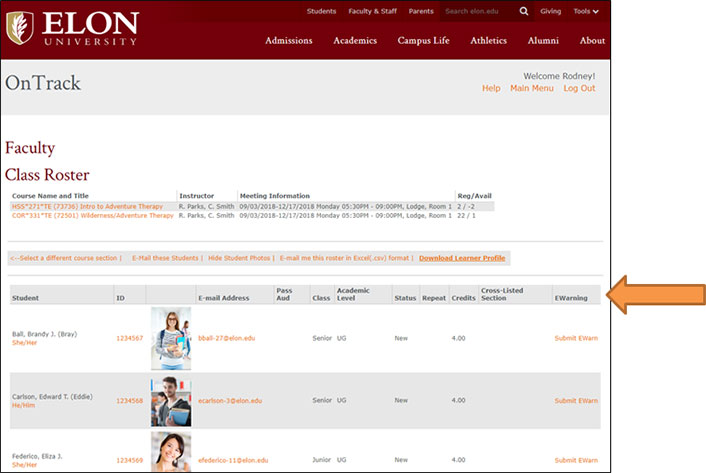Learning more about students' backgrounds—curricular and otherwise—can point faculty to content areas that will be especially useful for learners.

Registrars have long been advocates of student-centered policies and processes. However, the registrar's office can also play a pivotal role in helping faculty create a more student-centered pedagogy.
Consider, for example, how far we have come in modifying the traditional, generic class-attendance roll. With current tools, faculty today might have access through a class roll to student pictures, preferred pronouns, academic standing, and notification that the student has applied for graduation. Faculty might even be able to submit an e-warning through the class roll to alert advisors and student health and wellness personnel about students who aren't performing well. With our current capacity to modify the attendance process, even more student information could be provided to help faculty adjust the way they teach an individual section of a course.
To experiment with this idea, the Elon University Office of the Registrar created a report for instructors teaching capstone courses in the core curriculum. While capstone courses vary by institution and major, most are designed to serve as the pinnacle of a program of study, giving students experience in the practical application of their coursework. At Elon, the capstone is a course that provides an opportunity for students to integrate and apply what they have learned during their academic experience. The capstone also challenges students to consider broader themes of their program of study: ethical reasoning, personal and social responsibility, and global citizenship.
More than 40 seminar topics are offered each academic year, allowing students a wide range of choices. Students must take a capstone course outside the major field at the 300- or 400-level during their third or fourth year of study. Every capstone seminar is integrative and writing intensive and includes a capstone project.
The new report created by the registrar's office illustrates the distribution of courses completed by students enrolled in each capstone course, which enables instructors to adapt their multidisciplinary approach based on the disciplines in which their students excelled and those in which they might require additional focus. It also inspects another factor: common courses completed by students enrolled in each capstone course (see figure 1). By knowing which classes the students have (or have not) taken, instructors can further tailor their pedagogical approach to build upon the areas in which their students are stronger while providing additional emphasis in areas in which they are weaker.

As one faculty member noted, "I was stunned that nearly every student in my class had taken economics during the completion of their core requirements. As a result, I invited an economics professor to join me in a discussion on the impact of tariffs on the global economy." Similarly, another professor wrote, "I was surprised that students in my course who had managed to avoid history completely would register for a course titled 'Rome'!"
Given the perceived success of the initial trial, the registrar's office began to work with faculty to identify additional information that could positively impact the pedagogy of a course. Ideas regarding additional student-sourced data included the following:
- Current technologies students use outside the classroom
- The types of direct service or volunteer work that students have performed, as well as global education experiences
- Foreign languages taken
- Whether each learner identifies as an introvert or extrovert
- Country/region of origin
While some of this information is already available within the student system, some of it needs to be collected. To accomplish this, we will survey all students at the beginning of each fall using Colleague, Elon's student information system. The new Learner Profile will be available for download from the faculty member's class roll each semester (see figure 2). Initially, the profile will be standardized across the institution, but future iterations could be based on declared major.

Throughout primary and secondary schooling, teachers spend time getting to know the students in their classes. For those who teach, consider the questions we frequently ask a new class. This might include: Why are you taking this course? What do you hope to learn? What have you heard about the course? Questions could even relate to preferences for multiple-choice, essay, or competency-based testing in the course. Students' responses to these questions tell us very little about the individuals sitting before us. For faculty, having a comprehensive learner profile could have an immediate positive impact because it would enable us to engage students more quickly, help them feel connected to the institution, and open the door for faculty to learn more and students to share more about who they are as adult learners.
Rodney Parks is the University Registrar and Director of the Summer College at Elon University.
© 2019 Rodney Parks. The text of this work is licensed under a Creative Commons BY 4.0 International License.
